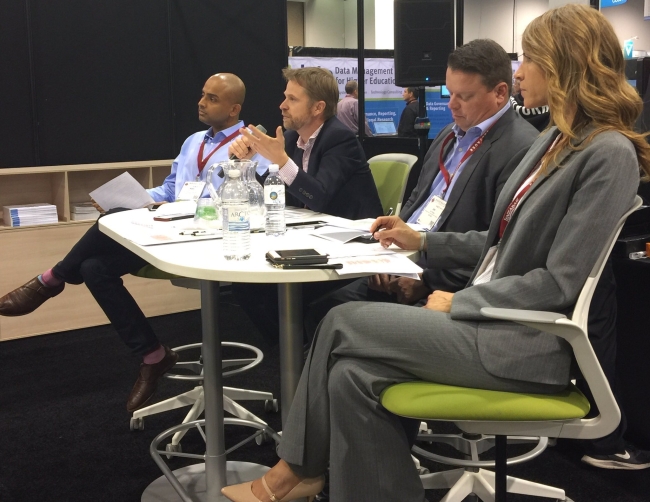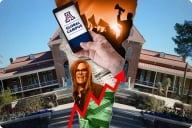You have /5 articles left.
Sign up for a free account or log in.

Judges listen to a proposal during the Pitch IT! Challenge.
Educause
ANAHEIM, Calif. -- Who will be Educause’s Pitch IT! Challenge champion?
The higher education IT organization will over the next 12 months throw its weight behind one of four finalists in the competition, which is aimed at solving some of the major issues facing higher education. Educause invited member universities to speak out about the biggest challenges facing their campuses -- the “elephants in the room that nobody has adequately addressed,” in the words of Jim Burnett, senior manager of strategic sales and business development.
After collecting submissions over the summer, Educause invited four finalists -- Bay Path University, Deakin University in Australia, Ringling College of Art and Design, and the University of Texas at Austin -- to present during the organization’s annual conference this week. The groups gave their final pitches during a Shark Tank-like session Wednesday afternoon to a panel of judges made up of representatives from Amazon Web Services, Dell, EdSurge and USA Funds, the latter of which sponsored the session.
The session was intended to whittle four down to one, but also to find potential collaboration partners for all the finalists. Educause is giving the winner an extra boost over the next year, pledging to recruit educators and ed-tech companies to help further develop the project.
“By this time next year, I’ll be standing on this stage introducing people who have addressed this problem,” Burnett said.
During 10-minute pitches, the four finalists presented solutions to problems involving cheating, credentialing, the low adoption rate of open educational resources and the lack of technology platforms built with art colleges in mind.
Wendy Sutherland-Smith, director of teaching and learning at Deakin University, focused her pitch on what she called the “wicked problem of authenticating student assessment online.” Online education has created new breeding grounds for academic dishonesty, she said, and while several ed-tech companies have sprung up in the space, many offer products that only target one form of cheating -- identity fraud or plagiarism, for example.
“What software companies need to do is realize what universities actually need is a one-stop solution,” Sutherland-Smith said. She highlighted an opportunity for a company to offer a suite of anticheating products and services -- identity verification, plagiarism detection, proctoring and more -- that work across institutional, technological and even national boundaries.
The judges grilled Sutherland-Smith on whether her pitch was different enough from existing products in the market. “What’s wrong with what’s already out there?” Jeffrey R. Young, a senior writer at EdSurge, asked.
Jeff Schwartz, interim vice president for academic affairs at Ringling College of Art and Design, presented after Sutherland-Smith. He pitched a prototype for DRAW -- short for Digital Resource Archive Warehouse -- a learning portfolio platform mainly intended for art and design colleges. DRAW, he said, is an answer to the struggles many such colleges face to find an all-in-one platform that can help them meet accreditation requirements but that also offers students opportunities for reflection and provides archiving, downloading and search features for artwork, photography and other nontext digital works.
“We had no idea of the value of this thing, and it became a game changer for us,” Schwartz said. While issues involving storage space and integration with learning management systems remain, he pointed out that more than 65 percent of students at Ringling already use the platform, even though faculty members don’t require them to.
Jeremy Anderson, deputy chief of academic technology at Bay Path University, followed with a strategy to increase the use of open educational resources at colleges and universities. Studies have shown open textbooks, which are often free or much less expensive than commercial textbooks, are struggling to gain traction even though more faculty members are becoming aware that alternative course materials exist.
“We’ve got OER, and we’re not doing anything with it,” Anderson said.
He presented a two-part solution: first, create interoperability standards for open educational resources; second, build a tool to let faculty members pick from open content that supports those standards that they can then use with whatever learning platform they offer their courses on.
The judges challenged Anderson to come up with an answer for what a “tipping point” for common OER standards would look like. Anderson’s response: “All we need is one vendor to say we’re going to work on this standard.”
Finally, G. Cooper Henson, a technical project manager at the University of Texas at Austin, used an anecdote about his own 11-year, five-college path to a bachelor’s degree to argue for a credentialing system that uses badges and block-chain technology instead of the traditional transcript.
“College transcripts don’t accurately reflect things we can do,” Henson said. “They reflect the accomplishments that we have.”
By using block-chain technology, which stores transactions (in this case, academic accomplishments) in a central ledger, students would be able to access all their badges, credentials and degrees in a single, secure location -- a much simpler system than having to ask colleges for copies of transcripts, Henson said. Such a system would also be beneficial for potential employers, he added, who would be able to see job applicants’ credentials and evidence of their skills.
The judges focused their questions on the block-chain technology, asking whether a transaction-based system is the best method of tracking academic achievements. Henson offered a defense of the technology, saying, “Transactions are immutable. They can’t be changed. That’s a good thing -- it makes it more secure.”
The winner of the Pitch IT! Challenge is set to be announced Thursday.
Update: Educause declared Schwartz the winner Thursday afternoon.








